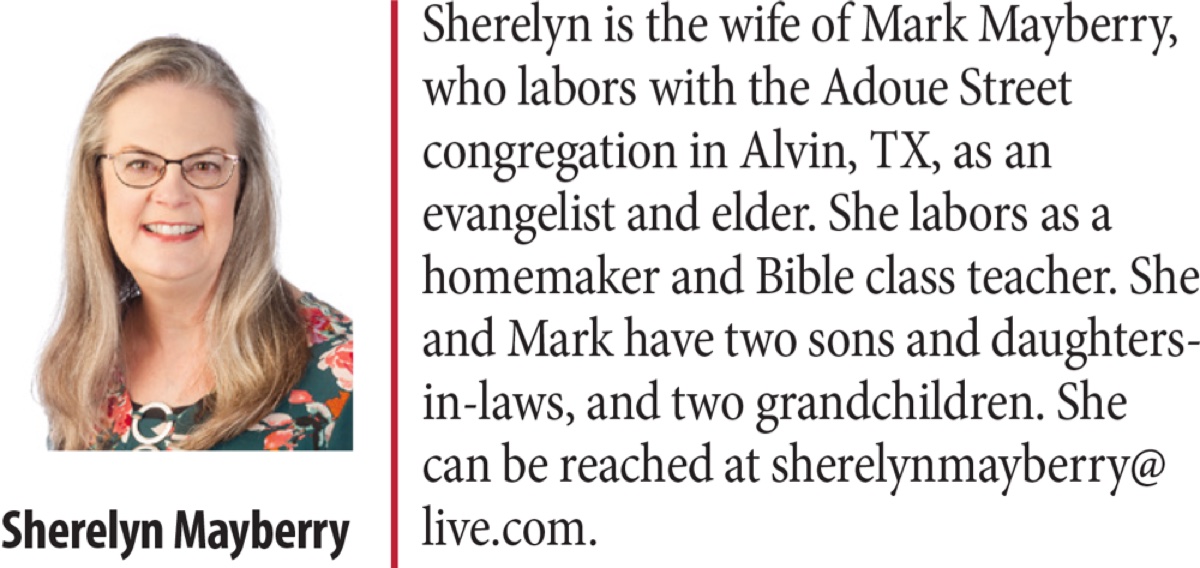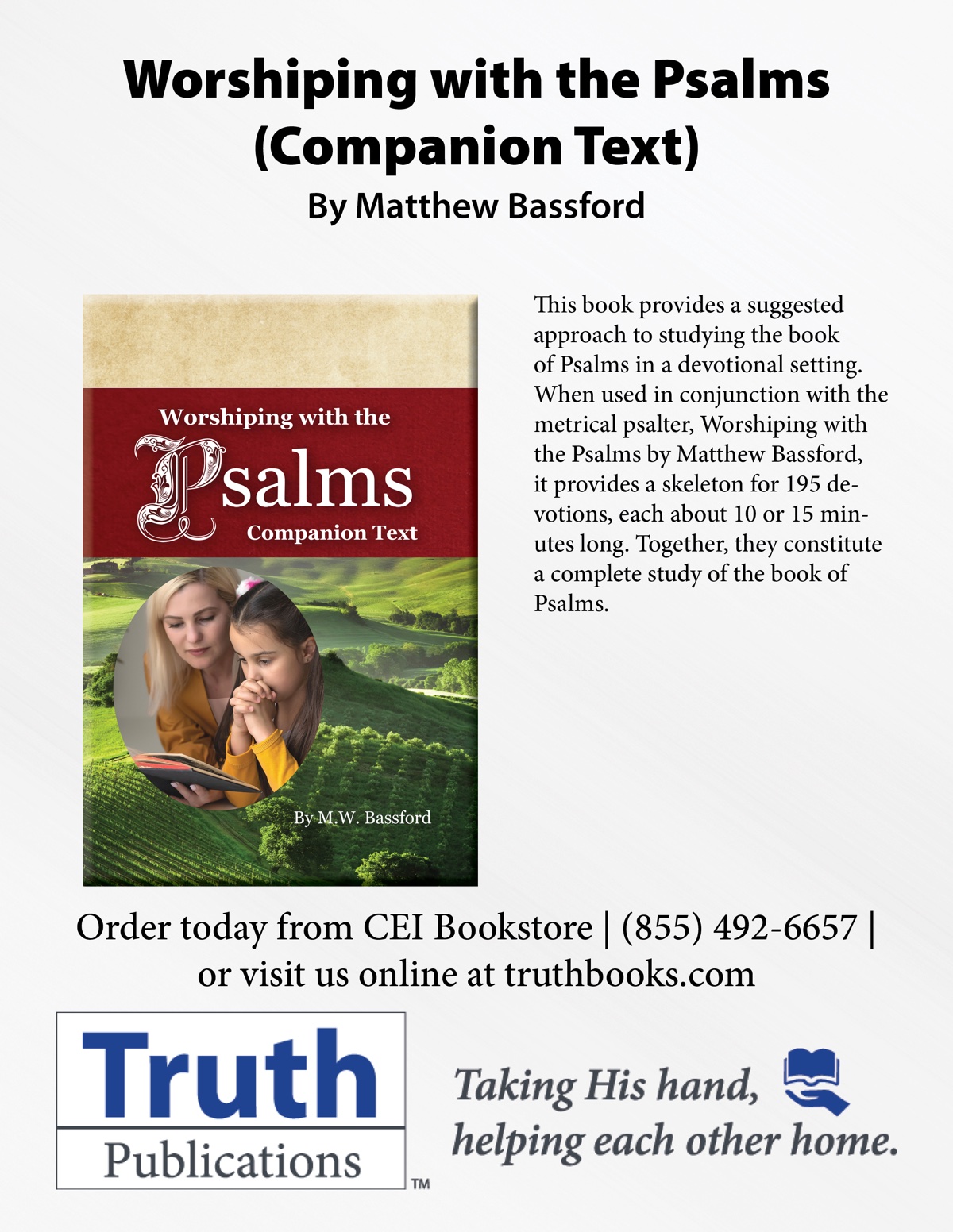by Sherelyn Mayberry
Synopsis: Therefore thus says the Lord GOD, “Behold, I am laying in Zion a stone, a tested stone, a costly cornerstone for the foundation, firmly placed. He who believes in it will not be disturbed” (Isa. 28:16, NASB).
The hymn “The Church’s One Foundation” (PHSS no. 366) addresses the thought that the church is built on the foundation of Jesus Christ our Lord. He died to bring life to His body, the church. There should be unity in this body, since saints are one in Him. Though the faithful are oppressed by the world, they look with hope for His return. At His coming, those who have lived in accordance with His will shall arise victorious to enjoy His glorious presence resting from their labors.
The church, the body of Christ, is made up of individual obedient believers with Christ laid as their foundation. “No man can lay a foundation other than the one which is laid, which is Jesus Christ” (1 Cor. 3:11). Christ Jesus is the chief cornerstone for a holy temple of the Lord. The building (individual Christians) is fitted together into a dwelling of God in the Spirit (Eph. 2:20-22). In Matthew 16:15-16, 18, Jesus says, “Who do you say that I am?” Peter answers, “You are Christ, the Son of the living God.” Upon this confession (“this rock”), the church was built. We can have confidence in making this confession that “the Lord knows those who are His,” standing on the firm foundation of God (2 Tim. 2:19).
The church is made up of “His new creation.” Being buried with Christ in baptism, Christians are raised to walk in newness of life (Rom. 6:4). Anyone in Christ, having been added to the church, is a new creature (2 Cor. 5:17; Acts 2:38, 47). This new creation has been born again of water and the Spirit and enters the kingdom of God (John 3:3-5). Thus, Christ saved us through His mercy by washing of regeneration (baptism) and renewing of the Holy Spirit (Titus 3:5-7).
Christ came to earth to seek His holy bride, the church. She was presented to Him as a pure virgin (2 Cor. 11:2). The kingdom of heaven, the church, is like ten virgins, waiting for the bridegroom, Christ, to come for them. Some were ready and some were not. Those who were ready went with Him to the wedding. They became the bride of Christ (Matt. 25:1, 6, 8-10).
Being redeemed, not with perishable things, but with the precious blood of Christ, those who are called by the Father should conduct themselves in reverence (1 Pet. 1:17-19). Christ, the spotless Lamb, offered His blood to cleanse the conscience of the faithful from dead works to serve God. Through His death, we have hope of redemption and the promise of eternal life (Heb. 9:14-15).
There should be unity in this body of Christ. The elect of God from all nations and races are made one in Christ in His one body, the church (Col. 3:11-12, 15). The saved look to the One Lord who exercises His right of authority. His charter of salvation involves one faith and one baptism, the new birth (Eph. 4:1-6). Salvation is found in no other name than Christ, the chief cornerstone (Acts 4:12). We are commanded to believe in the name of God’s Only Begotten Son, Jesus Christ, and love one another (John 3:16; 1 John 3:23). Jesus is the bread of life of which we must partake. He gave His flesh for the life of the world to those who share in Him by believing (John 6:35, 40, 48-51, 68-69).
Faithful Christians press toward the one hope of salvation. Great peace and hope come from loving God’s law and keeping His commandments (Ps. 119:165-166). Being justified by faith, we stand in God’s grace and exult in hope of glory (Rom. 5:1-2). The Lord Jesus Christ and God the Father loved us, giving us eternal consolation and good hope by grace. This realization provides us comfort and strengthens our hearts toward every good word and work (2 Thess. 2:16-17).
Though the church is oppressed, faithful saints look forward to Jesus’s return when joy comes again. The Corintian brethren were encouraged to speak the same thing in the name of Jesus—having no divisions among them, being perfectly joined together in the same mind and judgment (1 Cor. 1:10). Unfortunately, Paul does not praise them in this matter. There were divisions among them (1 Cor. 11:17). There should be no schism in the body. Members should care for each other (1 Cor.12:25). False teachers among the church may secretly introduce destructive heresies ripping the church apart (2 Pet. 2:1-3). These enemies of the cross are proud of their destruction and bring much sorrow to the church (Phil. 3:18-20).
After this oppression in the church, the faithful will return to song. In Revelation, John writes that the martyred saints wondered, “How long?” before God would judge and avenge those by whom they were slain (Rev. 6:9-10). He tells those who had died for the cause of Christ, they would each receive a white robe and could rest a while longer (Rev. 6:11). In contrast to the enemies of the cross in Philippi, Paul commends the faithful Philippians, calling them “my joy and crown” (Phil. 4:1). Joy comes after the storm.
Through tribulation, the church waits for perfect peace where the victorious army of God will rest from her conflict. In the world, we have tribulation, but we can take courage. In Christ, we can have peace with Him, because He has overcome the world (John 16:32). Being justified by faith, Christians have peace with God. Therefore, we exult in tribulation, which brings forth perseverance. Perseverance produces proven character and character gives hope that does not disappoint (Rom. 5:1-5). The Hebrew brethren endured sufferings and reproaches, which they accepted joyfully. They knew they had a better and lasting possession. As they pressed on, they could have confidence in receiving the reward promised (Heb. 10:32-36). Like the saints at Smyrna, we need not fear the testing of our faith that we will suffer. If we are faithful until death, we will receive the crown of life (Rev. 2:10). For the faithful of Christ’s body, the church, the mortal will put on immortality. Death will be swallowed up in victory (1 Cor. 15:54-57). Those who persevere, keeping the commandments of God and having faith in Jesus, die in the Lord. They are the victorious church, so they may rest from their labors, for their works follow them (Rev. 14:12-13).


